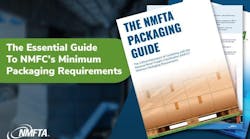The business news has been filled with stories about the pending sale of Chrysler. For the trucking industry, though, the real news is the ongoing series of realignments, restructurings and renewals that quietly signal a major shift in how the trucks you rely on will be built, sold and supported.
As big as the deal is financially, the split of Daimler and Chrysler will have little, if any, impact on commercial truck users. On the heavy and medium-duty side, Daimler's North American truck operations continue unchanged with Freightliner and its Sterling, Western Star and other subsidiaries. On the lighter vehicle end, Dodge will continue building and selling its Ram trucks.
The only shared products for Freightliner and Dodge are the Sprinter van and the Class 4-5 Sterling Bullet. The Sprinter is built at a Daimler factory in Germany and sold through Freightliner and Dodge networks. There's no reason that relationship wouldn't continue, even if the two no longer share a common owner. As for the Bullet, a Sterling-badged version of the Dodge Ram cab chassis, that arrangement also serves both parties and should continue unchanged.
There's another possible sale, though, that might have a more significant impact on truck buyers. Although neither party had confirmed it at presstime, there are reports that Navistar is talking to General Motors about buying its medium-duty truck business. It's all speculation at this point, but such a deal would most likely entail rationalizing overlapping product lines.
Such business shifts involving enormous sums always grab headlines, but truly important supplier changes for trucking have been taking place with relatively little notice by the general business media.
Perhaps most significant is the shift by truck builders away from the North American market's traditional model of multiple third-party suppliers to more emphasis on proprietary powertrains. The latest move is Paccar's announcement last month that it will build a facility in Mississippi to supply powerplants for its Peterbilt and Kenworth operations. Paccar is the last North American truck maker to enter the engine business, as in recent years Freightliner, Volvo and International have all invested in their own heavy-duty engines based on worldwide diesel platforms.
Independent truck engine makers Caterpillar and Cummins continue supplying engines for North America, but their relationships with the various truck makers have changed as they've been chosen to complement the OEMs' proprietary offerings. And both Caterpillar and Cummins have moved to become worldwide engine makers, essentially providing the proprietary engines for a variety of trucks in Europe and Asia.
That's the real change — our fairly insular North American truck market is now much more aligned with international markets. Pressures created by emissions reduction and the need for manufacturing productivity makes it inevitable that the costs will have to be spread among world markets, not regional ones. And while there are fewer choices in the specs book, look at your own bottom line and how those shared investments can meet today's requirements for cleaner, more efficient, more reliable trucks.
E-mail: [email protected]
Web site: fleetowner.com


